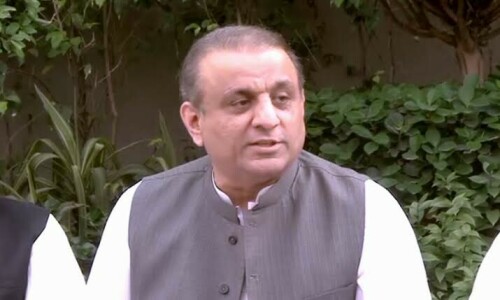THE weekend began with a surprise series of announcements that the governor of the State Bank of Pakistan and the chairman of the Federal Board of Revenue had been removed from their respective positions by the government.
The former was asked to resign while the latter learned that his transfer orders were being prepared. Coming in the middle of the negotiations with the IMF, that are at a critical juncture as they approach closure, and as the budget deadline looms, both announcements shook the country.
These are not unimportant posts; the State Bank governor is a co-signatory to the IMF agreement and the FBR chairman has to deal with the revenue target that forms a critical plank of any such programme.
So the timing was bound to raise questions, though the simple answer could be that stronger alternatives were needed in both these posts before any programme could be finalised.
Apart from the timing, the larger question now is the nature of the replacements and what shape future economic policy is likely to take after these changes.
What is clear is that the new adviser on finance, Abdul Hafeez Shaikh, is now putting together his own team.
Considering that Reza Baqir is being appointed as the next State Bank governor, it appears that Mr Shaikh wants to surround himself with people who are technically sound and command credibility in international financial markets and multilateral bodies.
In short, he wants to prioritise rebuilding the state’s credibility with its international lenders.
That credibility had taken a hit over the past three years as external-sector deficits grew and nothing beyond ad hoc and piecemeal policy steps were taken in acknowledgement of the problem.
It seems that now, after a hiatus of almost a decade, the State Bank is set to have a strong, technically sound and independent governor who will value excellence in the conduct and discharge of the central bank’s responsibilities — or one hopes anyway.
That may be a positive aspect but there is another dimension that needs to be kept in mind.
The country’s economy is driven by forces that go beyond its international creditors and financial markets. In fact, large-scale rackets play an important role in the foreign exchange, debt and equity markets.
The same is true of the revenue system and its myriad holes and pockmarked exemptions.
The new team, once in place, would be well advised to strike a balance between the technical and institutional knowledge that will be required to ensure that its policies don’t veer too strongly in one direction, or unwittingly become subject to elite capture through ways and means that the textbook does not warn us about.
An important step has just been taken, and the path ahead will test the government’s resolve. Strong people in key posts will be helpful for the government.
Published in Dawn, May 5th, 2019










































